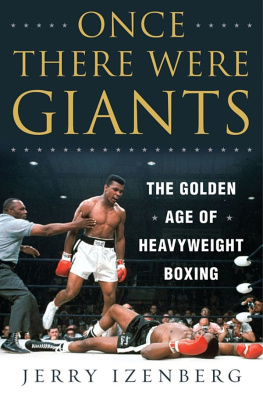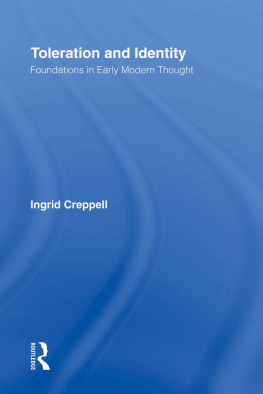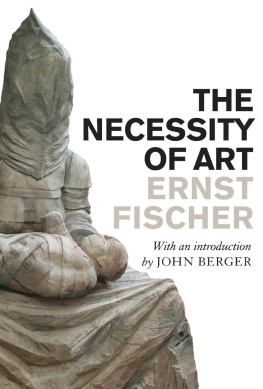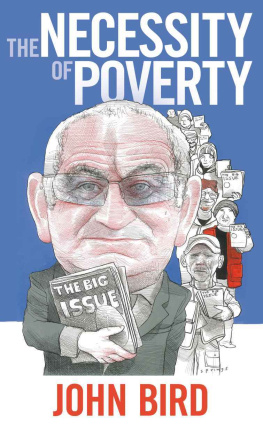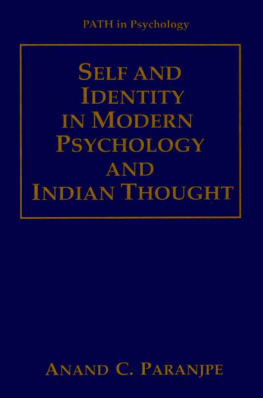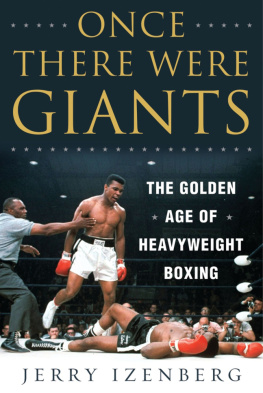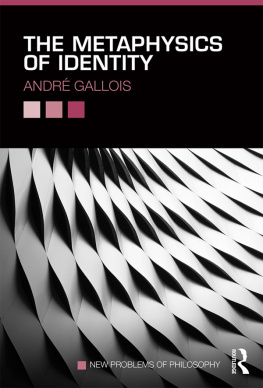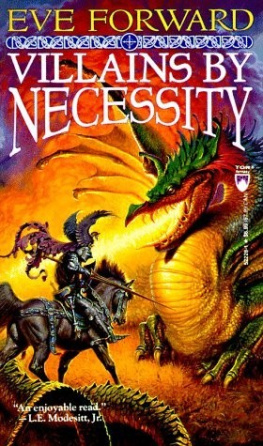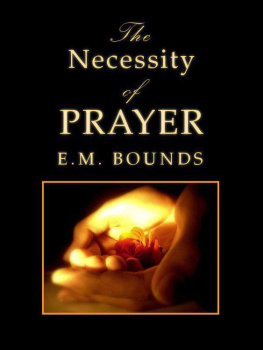Izenberg - Identity: The Necessity of a Modern Idea
Here you can read online Izenberg - Identity: The Necessity of a Modern Idea full text of the book (entire story) in english for free. Download pdf and epub, get meaning, cover and reviews about this ebook. year: 2016, publisher: Lightning Source Inc. : University of Pennsylvania Press, genre: Religion. Description of the work, (preface) as well as reviews are available. Best literature library LitArk.com created for fans of good reading and offers a wide selection of genres:
Romance novel
Science fiction
Adventure
Detective
Science
History
Home and family
Prose
Art
Politics
Computer
Non-fiction
Religion
Business
Children
Humor
Choose a favorite category and find really read worthwhile books. Enjoy immersion in the world of imagination, feel the emotions of the characters or learn something new for yourself, make an fascinating discovery.

Identity: The Necessity of a Modern Idea: summary, description and annotation
We offer to read an annotation, description, summary or preface (depends on what the author of the book "Identity: The Necessity of a Modern Idea" wrote himself). If you haven't found the necessary information about the book — write in the comments, we will try to find it.
Izenberg: author's other books
Who wrote Identity: The Necessity of a Modern Idea? Find out the surname, the name of the author of the book and a list of all author's works by series.
Identity: The Necessity of a Modern Idea — read online for free the complete book (whole text) full work
Below is the text of the book, divided by pages. System saving the place of the last page read, allows you to conveniently read the book "Identity: The Necessity of a Modern Idea" online for free, without having to search again every time where you left off. Put a bookmark, and you can go to the page where you finished reading at any time.
Font size:
Interval:
Bookmark:
Identity
INTELLECTUAL HISTORY
OF THE MODERN AGE
Series Editors
Angus Burgin
Peter E. Gordon
Joel Isaac
Karuna Mantena
Samuel Moyn
Jennifer Ratner-Rosenhagen
Camille Robcis
Sophia Rosenfeld

The Necessity of a Modern Idea
Gerald Izenberg

Copyright 2016 University of Pennsylvania Press
All rights reserved.
Except for brief quotations used for purposes of review or scholarly citation, none of this book may be reproduced in any form by any means without written permission from the publisher.
Published by
University of Pennsylvania Press
Philadelphia, Pennsylvania 19104-4112
www.upenn.edu/pennpress
Printed in the United States of America on acid-free paper
1 3 5 7 9 10 8 6 4 2
Library of Congress Cataloging-in-Publication Data
ISBN 978-0-8122-4808-1
For Toby and Miri
To Whom I Owe a Dedication
and
For Ziva
To Whom I Owe Everything

Identity is so in that the question about the identity of a culture has in many places created a culture of identity.
Wolfgang Bergem, Identittsformationen in Deutschland
In the contemporary Western imagination nothing about the self seems more self-evident than the idea that we have, or seek, an identity. People need to define themselves, we believe, to know and to be able to tell others who or what they are. Identity has so permeated academic and popular discourse that it can appear to have always been a fixture of both. We speak readily in the family, the media, and the marketplace of gender identity, identity crisis, identity politics. Only the availability of large electronic databases enables scholars to survey the otherwise unmanageable numbers of books and articles in the humanities and social sciences with the word identity in their titles, let alone their content. When I suggested to students in courses on the history of identity that it was a new idea, they invariably responded skeptically, Didnt people always have identities?
Though the answer to their question is in one sense yes, we know from recent research that the use of the word identity with the meaning my students took for granted is historically new. Not surprisingly, it has also produced a strong backlash: is identity a valid concept at all?
Like class or unconscious, identity is one of those words that have made the transition from technical concept in social science to everyday language. It undoubtedly helped that in virtually all such cases the words already existed in the vernacular with related meanings. But the newness of usage in the case of identity is easy enough to document.
Disciplinary encyclopedias and manuals tell the story for the academic disciplines and the professions. The first Encyclopedia of the Social Sciences, published in 1936, had no entry for identity; it appeared for the first time in the 1968 edition. Identity is not to be found in the original Dictionary of the History of Ideas in 1973, nor in the magisterial German reference work of basic historical concepts, Geschichtliche Grundbegriffe in 1982;
The shift in the meaning of identity in everyday discourse was equally abrupt. Identity had long been an everyday word in English, French, and German, though identit and Identitt seem to have had somewhat more technical implications than the English word from early on. The first edition of the classic German Brockhaus Concise Dictionary (Conversations-Lexikon oder kurzgefasstes Handwrterbuch) in 18091811, intended as a reference work for the would-be educated speaker, defined Identitt with implicit reference to its meaning in logic as Oneness. Identical statements, statements with the same meaning, though differently expressed. The more ambitious and for a long time authoritative French dictionary of Emil Littr, published between 1863 and 1872, defined identit as the quality which makes one thing the same as another, but differentiated jurisprudential, medical, grammatical, and philosophical uses of the word. Examples of the first two were discovering the identity of a suspect or a corpse, and determining whether someone is really who he claims to be. Significantly, the words listed philosophical meanings included Lockes concept of self-identitythe consciousness that one has of oneself as the same person through timeand Hegels concept of absolute identity, the unity of particular and universal, or subject and object. Apparently educated Frenchmen were expected to be familiar with both.
Websters American dictionary of 1828 defined identity as Sameness, as distinguished from similitude and diversity. We speak of [the identity] of things,... of persons, or of personal identity. Examination of American newspapers and periodicals from the nineteenth and early twentieth centuries shows that the word identity was an everyday word in all these meanings, and more. Its most common use was to identify persons by objective markers that located them along a set of public axes established for bureaucratic purposes in the modern state: name, sex, age, address, occupation, parentage for minors, and physical appearance. Such markers were employed, among many other purposes, to identify crime victims and adjudicate inheritance claims by those purporting to be the persons named in a will. They determined what was understood before Erikson as a persons identity.
Less frequently, though not uncommonly, identity referred to group rather than individual continuity, as in articles about the identity of a political party; the reference was always to specific policies with which the party was identified. There was even the rare use of the phrase national identityonly three appearances in the New York Times in forty yearsas an almost throwaway term with the sense of national uniqueness but without any indication of what constituted it.
Starting in the mid-1950s, however, and with increasing frequency after 1960, identity appeared with a new meaning which soon almost completely usurped the old, though the latter of course persists. Often the reference was to the idea of a quest for identity, a search for self-definition conceived as a psychological state that had to be subjectively achieved. Thus a New York Times reviewer described a recently published autobiography as recording A Desperate Need for Identity (October 23, 1955); another Times reporter described Eastern European refugees in German camps as People in Search of Identity (September 20, 1956). Writing in the Chicago Daily Tribune, a reporter asked Can the Jewish People Retain Its Identity? noting that When an age enters on a time of radical transition, loss of identity ensues. Societies and civilizations which had once enjoyed a clear sense of purpose and self-understanding seem to forget what they are (July 17, 1960). A Tribune article a few years later with the headline Women Told How to See True Identity reported a commencement address by the chairman of the Atomic Energy Commission in which he said that one of the problems of todays educated woman is finding her true identity among all the external forces telling her to do this or to be that, or to fit into a prefabricated pattern (June 6, 1963).
Next pageFont size:
Interval:
Bookmark:
Similar books «Identity: The Necessity of a Modern Idea»
Look at similar books to Identity: The Necessity of a Modern Idea. We have selected literature similar in name and meaning in the hope of providing readers with more options to find new, interesting, not yet read works.
Discussion, reviews of the book Identity: The Necessity of a Modern Idea and just readers' own opinions. Leave your comments, write what you think about the work, its meaning or the main characters. Specify what exactly you liked and what you didn't like, and why you think so.

